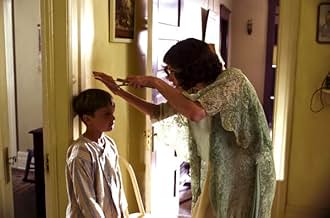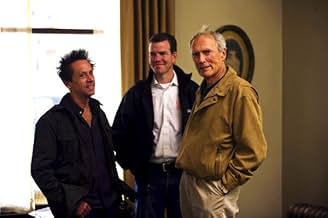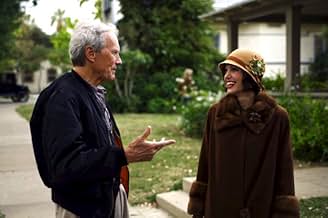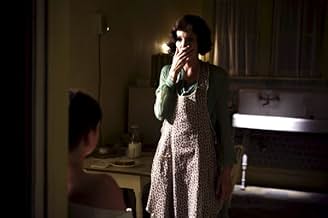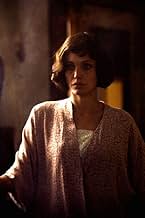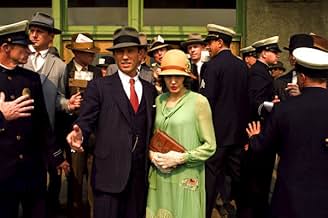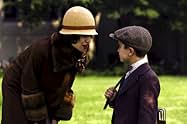Une mère en deuil s'en prend à la police de Los Angeles à son propre détriment lorsqu'elle tente de faire passer un imposteur évident pour son enfant disparu.Une mère en deuil s'en prend à la police de Los Angeles à son propre détriment lorsqu'elle tente de faire passer un imposteur évident pour son enfant disparu.Une mère en deuil s'en prend à la police de Los Angeles à son propre détriment lorsqu'elle tente de faire passer un imposteur évident pour son enfant disparu.
- Réalisation
- Scénario
- Casting principal
- Nommé pour 3 Oscars
- 14 victoires et 55 nominations au total
Avis à la une
Angelina Jolie does a superb job of portraying a Los Angeles woman ("Christine Collins") in the late 1920s whose boy is kidnapped. Five months later, the "proud" police department brings her kid back, making it a good PR session. Unfortunately, it's not her kid and stupidly, although she's naturally upset about, she poses with the kid and takes him home. (Would that really happen?).
Then she begins her quest of finding her real "Walter." Further twists and turns make the story increasingly horrifying. In all, you won't be able to keep your eyes off the screen wondering if justice will ever prevail in the end and who exactly is involved in what. It's not particularly a fun ride - you'll have a frown on your face for quite some time - but it sure is interesting and an excellent two hour-plus of entertainment. By the end, you'll be emotionally exhausted.
Kudos to all the actors in here for riveting performances and to the production and design team for a great period piece. Where else can you feel you're back 75-80 years in time with the boxy cars and flapper hats than in movies?
ClintEastwood s knows a good story, and he knows how to tell it on film. Not everything he does is as powerful as his depiction of a dynamic female boxer in Million Dollar Baby, for which Hilary Swank won a best actress Oscar among four for the film. In Changeling he presents another strong woman, Christine Collins, played by the notable Angelina Jolie. Because she is directed to weep at almost every turn and regularly underplay her grit, Jolie won't win accolades, nor will Eastwood rack up the nominations as he frequently does in Oscar season. But his adaptation of the historic Wineville Chicken Murders chills with his perceptions about the capriciousness of crime and the determination of those who choose to fight it.
In a Prohibition-era 1928, Collins gets word that the Los Angeles Police Department is returning her kidnapped eight-year old son. When she sees him at the station, a finely directed sequence showing the forces of motherhood and politics clash, she knows it is not her child. LAPD, needing the good publicity, forces her to take the boy overnight with the logic that she is merely in shock. The rest of this overly long thriller carefully traces the discoveries leading to resolutions and disappointments. Along the way, police corruption is exposed, mental institution incarceration of women is laid bare, and grisly serial murdering is slowly detailed.
Yet in this discursive narrative, Eastwood indulges himself beyond Jolie's annoying crying by gratuitously laboring over the details of an execution. The stark San Quentin setting is ghastly and the villain worthy except for the film's obvious criticism of false mental institution lockup, ironic here because this murderer is clearly deranged enough to be determined unfit for trial.
As in every Eastwood production, the values are first-rate, in this case period costuming and vehicles (those Model T's and trolley cars are beautiful). As in Mystic River, Eastwood knows how to splice family and community together in the struggle against organized crime, from street violence to public service malpractice. The activist preacher Reverend Briegleb (John Malkovich) helps bring the worlds together in his radio broadcasts, Malkovich for once playing good well. Eastwood continues to be the director of choice for depicting crimes and heartaches that strike the common citizen at will.
We all should be as productive in our later years. May he extend well beyond his golf-playing days and into our future.
Le saviez-vous
- AnecdotesScreenwriter J. Michael Straczynski first learned of the story of Christine Collins from an unnamed source at Los Angeles City Hall. The source had stumbled across case files regarding the Wineville Chicken Coop Murders among other discarded documents scheduled for destruction. Straczynski took the files and became obsessed with the case, doing extensive research over the course of a year. He tried to make it into a television project, but never found a solid way to do that. Virtually every event depicted in this movie appears as cited in legal documents, with dialogue often taken verbatim from court transcripts. Straczynski wrote his first draft of the screenplay in only 11 days.
- GaffesDetective Ybarra uses the term "serial killer," coined by FBI Special Agent Robert K. Ressler in the 1970s.
- Citations
[last lines]
Christine Collins: Three boys made a run for it that night, Detective, and if one got out, then maybe either or both of the other two did too. Maybe Walter's out there having the same fears that he did. Afraid to come home and identify himself, or afraid to get in trouble. But either way, it gives me something I didn't have before today.
Detective Lester Ybarra: What's that?
Christine Collins: Hope.
- Crédits fousThe black-and-white Universal logo used in the 1940s opens the film.
- ConnexionsFeatured in Los 10 magníficos: Clint Eastwood (2008)
Meilleurs choix
Détails
- Date de sortie
- Pays d’origine
- Langue
- Aussi connu sous le nom de
- The Exchange
- Lieux de tournage
- Sociétés de production
- Voir plus de crédits d'entreprise sur IMDbPro
Box-office
- Budget
- 55 000 000 $US (estimé)
- Montant brut aux États-Unis et au Canada
- 35 739 802 $US
- Week-end de sortie aux États-Unis et au Canada
- 489 015 $US
- 26 oct. 2008
- Montant brut mondial
- 113 398 237 $US
- Durée2 heures 21 minutes
- Couleur
- Mixage
- Rapport de forme
- 2.39 : 1







